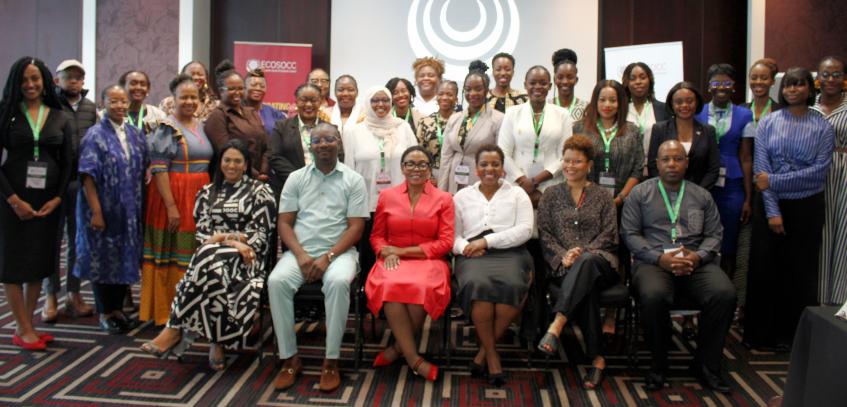From November 15-16, 2024, the African Union's Economic, Social, and Cultural Council (ECOSOCC) held a Women and Gender Advocacy Workshop on the African Union Free Movement Protocol (FMP) marking the end of a transformative 3-year initiative. The workshop, a collaborative effort between the African Union (AU) and the GIZ African Union office, has been instrumental in raising awareness, promoting popularization, and advancing the domestication and implementation of the FMP across the continent.
Key stakeholders gathered in Johannesburg to discuss critical challenges surrounding free movement, with a focus on empowering women and youth as central actors in achieving Africa's integration agenda.
South Africa's Deputy Minister of Public Service and Administration. Ms. Pinky Kekana set the tone with a keynote address calling for unity in eliminating barriers to movement.
"Women are disproportionately impacted by barriers to movement," she stated. "To build a united Africa, we must rise to the challenge of removing these barriers and confront the many hurdles to the FMP's implementation."
She also highlighted the role of Africa's youth as the most entrepreneurial and connected generation, advocating for investment in their potential to innovate solutions for the continent's challenges.
Head of ECOSOCC Secretariat William Carew underscored the workshop's significance, stating, "For too long, young people, especially young African women, have been excluded from major economic opportunities. ECOSOCC renews its commitment to elevating their voices and equipping them with tools to bring policies to life. From this workshop, we will develop the Johannesburg Action Plan, a policy document that will integrate gender considerations into the FMP and the African Continental Free Trade Area (AfCFTA)."
The closing session saw additional reflections on the workshop's achievements and its lasting impact. Ms. Onike Shorunkeh-Sawyerr from the GIZ African Union office reiterated the organization's steadfast support for advancing the FMP's popularization, ratification, and operationalization.
"We will also feed the outcomes from this workshop into the development of other programs moving forward," she noted, emphasizing GIZ's commitment to ensuring the momentum continues.
Following the adoption of the draft "Johannesburg Declaration," ECOSOCC's Head of Programmes Nana Osei expressed gratitude to participants and explored the potential for expanding similar initiatives.
"I'd like to see if we can use this platform to engage youth and women in other areas of work we do. This workshop has validated why ECOSOCC collaborates with the GIZ on this theme and others," he said.
Head of Secretariat William Carew extended his thanks to the GIZ African Union team for their enduring partnership over the past three years.
"When we started, all we had was a vision. The journey has given us lessons and examples of what to do on the run toward championing and popularizing the Free Movement Protocol. This has been possible through the collaborative work we've done all these years," he said.
He also acknowledged the participants and technical experts whose contributions have been vital to the initiative's success.
The workshop culminated in the adoption of the "Johannesburg Declaration" and the drafting of the Johannesburg Action Plan. The document will serve as a roadmap for integrating gender considerations into the Free Movement Protocol and advancing its implementation alongside AfCFTA objectives.
Participants engaged in robust discussions and collaborative activities, focusing on practical solutions to the barriers facing free movement. The workshop highlighted how the FMP could be leveraged to promote economic integration, gender equity, and sustainable development across the continent.
The event marked the close of a 3-year journey but sets the stage for the next chapter in the FMP's operationalization. As ECOSOCC and its partners move forward, the commitment to empowering women, youth, and marginalized communities will remain at the forefront of their efforts.





